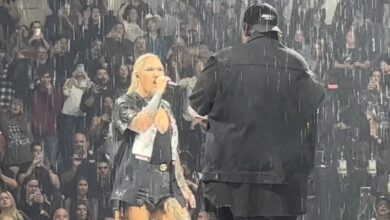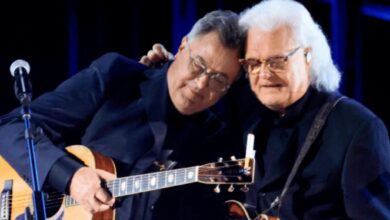Jelly Roll debuts “Dreams Don’t Die” on Fire Country, echoing themes of hope, redemption, and second chances
In the second episode of Tulsa King’s second season, a surprise moment brought an unexpected level of emotion and authenticity to the storyline. The episode featured a guest appearance by country and hip-hop artist Jelly Roll, who stepped into a scene with ease and charisma, blending the worlds of music and television. The setting was a celebratory grand opening at a cannabis dispensary, a location already pulsing with energy and local excitement.
As the scene built up, viewers saw Dwight “The General” Manfredi in his usual sharp form, engaging with attendees when he encountered Jelly Roll. However, in a moment of light-hearted misrecognition, Dwight jokingly called him “Jellyfish,” setting the tone for what would become one of the most talked-about moments of the episode. With a grin, Jelly Roll played along, claiming to be the janitor. It was a quick exchange, but it paved the way for a scene that would carry more emotional weight than expected.
What followed was a blend of humor and soul as Jelly Roll asked to use the store’s vocal booth—previously introduced as a quirky feature of the dispensary. Once inside, he didn’t joke around. Strumming gently, he performed “I Am Not Okay,” a song that hits hard with its vulnerable, unfiltered lyrics. The casual party atmosphere slowly shifted as the music poured out, drawing attention and silencing the crowd around him.
The performance felt anything but staged. Jelly Roll’s delivery was raw, deeply personal, and resonated with the characters present as well as the audience watching from home. His gravelly voice carried the weight of the lyrics—words that touched on mental health, brokenness, and the journey to self-acceptance. It was a rare moment in a crime drama where everything slowed down to make space for reflection and humanity.
Within the narrative, the song reflected more than just Jelly Roll’s personal style—it mirrored the struggles that Dwight and those around him face. The idea of redemption, of trying to be better while carrying the burden of past mistakes, is at the heart of both the show and the song. This subtle parallel allowed the scene to land not just as entertainment, but as a moment of meaning.
While some viewers may have expected a brief cameo, the scene offered more. It brought depth to Jelly Roll as an artist and character and expanded the emotional palette of the show itself. Rather than feeling like a celebrity insert, it was a surprisingly organic fit—something that added to the authenticity rather than detracted from it.
Jelly Roll’s presence also marked an evolution in his own career. Though he’s no stranger to public stages, this appearance marked one of his first in a scripted series. It revealed a side of him not often showcased, blending his real-life musical identity with a narrative arc that welcomed his voice and vulnerability. For fans of his music, it was a treat; for others, it may have been an introduction to a layered artist with a compelling story.
The decision to let Jelly Roll perform live within the show’s universe also elevated the scene. Unlike lip-synced or overly polished segments sometimes used in television, this one was grounded. There was no overproduction—just a man, a guitar, and a message. It reminded viewers that sometimes, the most powerful moments don’t require elaborate setups.
In the context of the show’s themes—loyalty, reinvention, struggle, and survival—the song “I Am Not Okay” fit seamlessly. It was more than just a musical interlude; it was a character study in and of itself. As Dwight continues to carve out a new life post-prison, moments like this highlight that change, while possible, is always laced with pain.
Audience reactions were as varied as the song’s emotional impact. Some felt caught off guard in the best way, noting how the unexpected performance brought tears or reflection. Others may have found it jarring within the fast-paced world of the show. Still, the lasting impact was clear—people talked about it, shared it, and wanted to revisit it.
The dispensary setting added an ironic twist to the emotional gravity of the performance. A place typically associated with light-hearted, stoner humor suddenly became the stage for a heartfelt confession. This contrast only added to the resonance of the moment, reminding viewers that profound things can happen in the most unlikely spaces.
It also showcased how music can unify people, even within a fictional world. As Jelly Roll sang, characters who were otherwise strangers or caught in their own arcs paused, listened, and connected. For a series focused on conflict and control, that brief moment of collective attention felt striking.
By the time the scene ended, it left a kind of emotional residue—something unshakable. It wasn’t just a break in action; it was a highlight. Jelly Roll didn’t just make a guest appearance; he left a mark. One that, in a few short minutes, said as much as an entire episode’s worth of dialogue.
Moments like this underscore how television is changing. With more cross-medium collaborations, viewers are invited to engage with characters and stories in new ways. Whether it’s a song, a scene, or a brief performance, the line between real-world artists and fictional worlds continues to blur—and when done right, the results can be unforgettable.
In Jelly Roll’s case, this wasn’t just a performance. It was a statement—about being seen, about being heard, and about being okay with not being okay. And in a show built on the backs of complex, layered people trying to rewrite their stories, that message fits right in.





